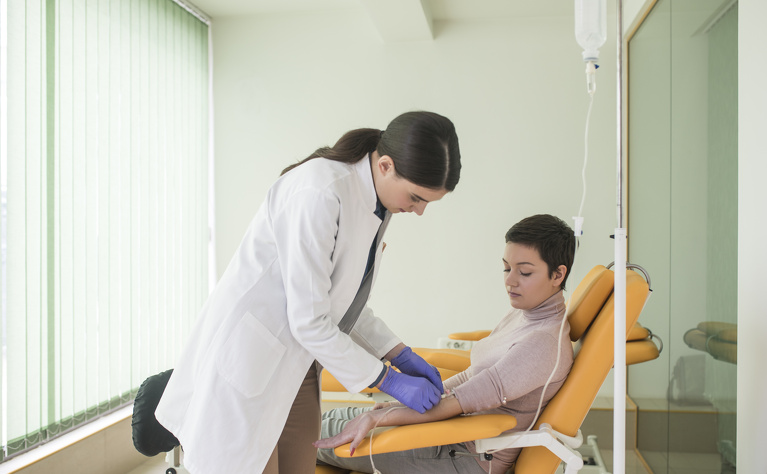
Some medications for inflammatory bowel disease are given as an intravenous (IV) infusion, including certain biologics. Find out how they are done in this article.
Some medications for inflammatory bowel disease are given as an intravenous (IV) infusion, including certain biologics. It’s quite likely you haven’t had an infusion before and you may not really know very much about what they involve. This article will look more closely at biologic infusions, and what to expect when you have yours.
Biologics are medicines genetically engineered from living organisms and they are commonly used to treat inflammation and maintain remission in Crohn’s disease, ulcerative colitis and other forms of inflammatory bowel disease. They are often an option when other medicines like immunosuppressants (such as azathioprine and mercaptopurine) and steroids (such as prednisolone and budesonide) haven’t been effective.
Biologics target certain proteins and enzymes in your body involved in causing inflammation and IBD symptoms. Biologic medicines can be given as an injection, a tablet or an infusion. How your medication is given will depend on the type of biologic you are prescribed.
Intravenous means ‘into a vein’. Medicines and other fluids can be given directly via a vein into your bloodstream. A fine tube, called a cannula, is inserted into a vein, usually in your arm or hand, using a needle. The cannula is then connected by an IV line (a long, thin tube) to an infusion pump which delivers the medicine or fluid.
Infusions are usually given by medical staff in a hospital or clinic, although in some circumstances they can be given at home by a trained healthcare professional.
Infusions are used to deliver many different medicines and fluids, including:
Infusion therapy is used when it is necessary to control the speed medicines enter your bloodstream over a specified period of time. It can be used for patients who are unable to take medicines or fluids by mouth, or to deliver certain medicines which, if taken orally would be destroyed by acid and enzymes in the body, preventing them from working properly.
Some biologic medicines are given by intravenous (IV) infusion. These include:
When you have your initial infusion, your dose is worked out based on your weight, usually 5mg for every kilogram you weigh. You will have a second and third infusion two and six weeks later. Then, if you are responding well to your biologic medicine, you will have maintenance infusions every eight weeks.
You will have your initial infusion which is usually a standard 300mg dose. You will then have a second and third infusion two and six weeks later. Depending on how well you respond, you may have a further infusion at week 10 if you have Crohn’s disease. You will then have maintenance infusions every eight weeks.
Sometimes your IBD team may increase your treatment to infusions every four weeks if your symptoms have not improved enough.
You will have your initial (induction) dose of ustekinumab as an infusion, worked out according to your weight, approximately 6mg for every kilogram you weigh. Your next dose will be eight weeks later, and will be delivered by subcutaneous injection. This will be a standard dose of 90mg. From then on you will usually continue to have ustekinumab by injection every eight or 12 weeks.
If you do not appear to be responding after your first few doses of biologic medicine, or are experiencing significant side effects, your IBD team may decide to stop your treatment, or try another type of biologic medicine.
You will probably continue biologic treatment for at least a year, and may continue taking them for several years. You will be checked at least every 12 months to ensure the treatment is still right for you. It is possible to build up antibodies which could make the biologic less effective. If this happens you may need to move onto another medication.

Your first infliximab infusion will take about two hours. You will be closely monitored during the infusion and for two hours afterwards, to make sure you don’t have an allergic reaction.
You may be given pre-medications, such as steroids or antihistamines, before your infusion to help prevent a reaction to the infusion and minimise the risk of side effects. If you have had a reaction to an infusion before, your dose may be given more slowly to decrease the risk of another reaction.
In total, infusion sessions can take between four and six hours initially. Once you have had a few successful treatments, your infusion may be given more quickly, and your monitoring time reduced, speeding up the whole process.
Your infusion itself will take around 30 minutes. You will be closely monitored during your infusion and for around two hours afterwards, to make sure you don’t have an allergic reaction.
If you have had an infusion reaction before, you may be given pre-medication, such as steroids or antihistamines.
In total, sessions can take between two and three hours. Once you have had a few infusions, your monitoring time may reduce, shortening your time infusion sessions.
Everyone is unique, experiencing pain and discomfort differently, so this is a hard question to answer. People report varying levels of discomfort at having a cannula inserted into their vein, some experiencing little or no discomfort at all. Most people don’t feel anything when the medicine goes into their vein, although occasionally it can feel cool for a short time.
The build up to, and worry about having, an infusion can often be worse than the actual infusion itself. On top of that you might be concerned about the time it takes to have an infusion, the need to take time off work, or organise childcare. You may find it becomes easier after a few treatments, are more familiar with the routine, and know what to expect. Hopefully by then you will also be feeling better.
If you feel unwell in the days leading up to your infusion, it is important you contact your IBD team for advice, as your infusion may need to be rescheduled.
When you go for your infusion:
Before your infusion
When it's time for your infusion
Some people report feeling fatigued, nauseous and having headaches following an infusion, whilst others report no side effects at all. Some people notice bruising and discomfort around the place where your cannula was inserted, but this should go away on its own.
If you start to feel unwell in the days following your infusion, contact your IBD team straight away.